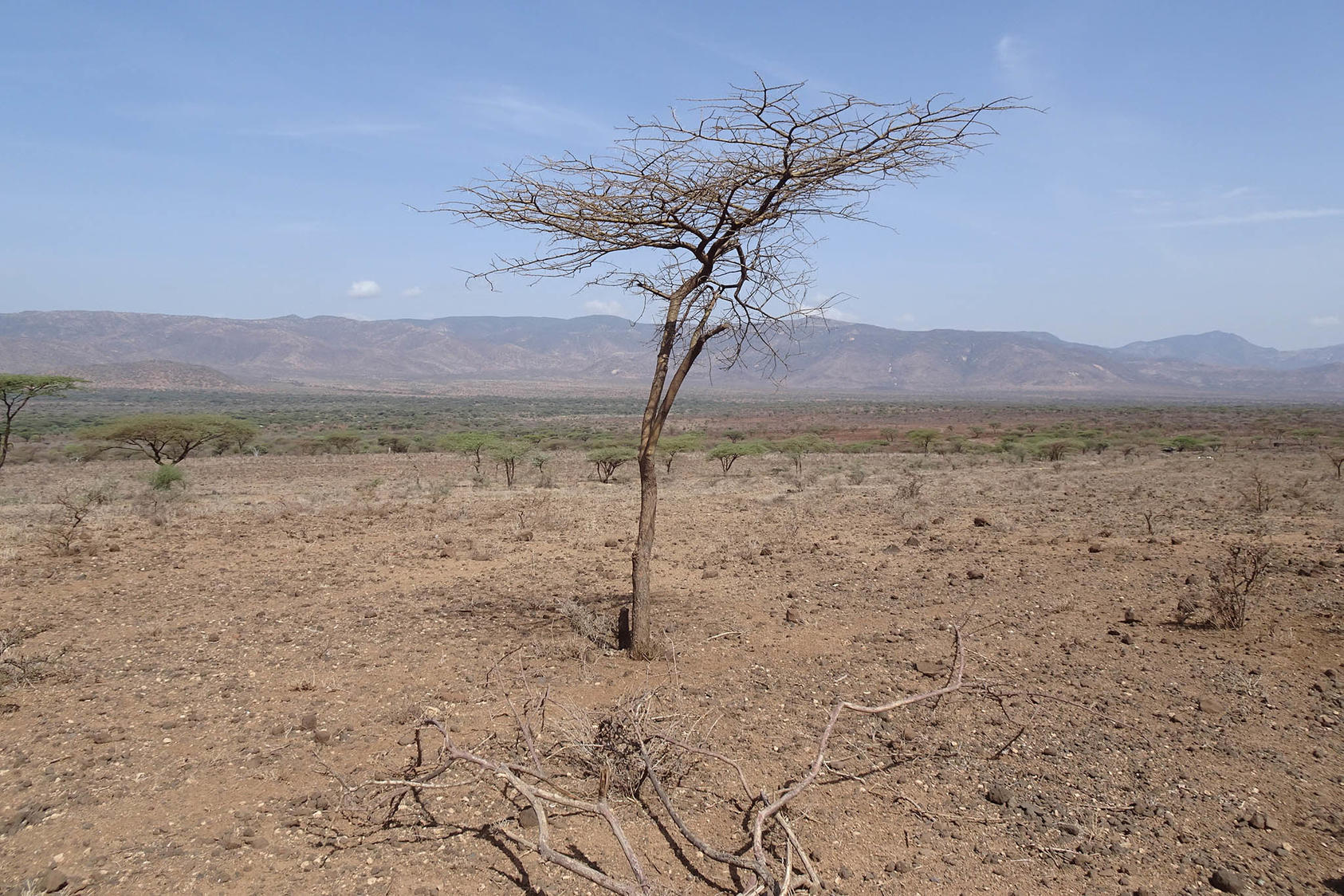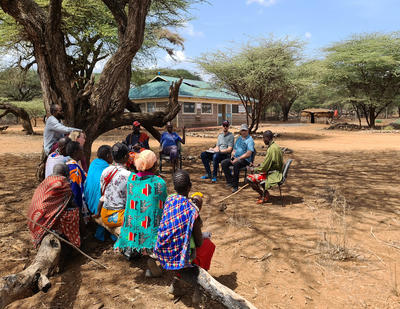Amid lengthening droughts in a changing climate, millions of herders in northern Kenya are watching their traditional grazing lands dry and harden. As in pastoralist regions from Mongolia to the Sahel, Kenyan herders are now guiding their cattle, camels, sheep or goats longer distances in search of pasturage. The competition for scarcer grassland and water has triggered conflicts and bloodshed among herding communities. But at the grass roots of northern Kenyan society, activists are combining local knowledge and peacebuilding skills to create new ways for rival groups to cooperatively adapt to the changes from a degrading climate.

In Laikipia, a wide plateau of rolling savannah and forests, local organizers like Ramson Karmushu are building a network of environmental peacebuilders who are helping their herding communities — Maasai, Samburu, Rendile, Borana and Turkana — cooperate for survival. Karmushu, 31, is an ethnic Maasai from a sub-tribe called Il-Ngwesi. As a boy he herded his family’s cattle for months at a time, camping in the region’s dry forestlands — and he later trained as a tour guide for the region’s wildlife conservancies. But witnessing the violence in his region, Karmushu has been working for years with a local peacebuilding group, the Indigenous Movement for Peace Advancement and Conflict Transformation (IMPACT).
“In northern Kenya, we come from many different communities that all practice pastoralism and that all face similar challenges,” Karmushu said in an interview, “but we will not be able to solve these issues — of climate change, the loss of our grazing lands and having a future for our people — unless we can solve our conflicts peacefully and be united.”
Communities’ new desperation from drought intensifies old land disputes reaching back to Kenya’s colonization by Britain. Much as in the Americas and Australia, the European colonists took the most desirable lands, using disputed treaties and armed force to drive indigenous peoples to less fertile regions. British settlers flocked to Laikipia’s high-altitude climate, building farms, ranches and towns in what became known as Kenya’s “White Highlands.” After independence in 1963, many, but not all, white landowners left, and Kenya’s government distributed their holdings in ways that deepened Laikipia’s economic inequities. Thus, generations of land seizures shuffled ethnic communities over the landscape and left many groups marginalized.
Climate, Economic Changes Sharpen Disputes
As in many areas where land use causes conflicts — Somalia, South Sudan and others — Laikipia’s generations-old disputes are intensified not only by drought but by more sophisticated weaponry, communications and transportation. “Climate change is degrading areas of land and forcing pastoralists to move long distances in search of pasture,” Karmushu said. “Communities in conflicts can more easily get weapons, more powerful ones than before. And mobile phones and motorbikes are making it easier” for rival groups “to conduct larger, more deadly attacks and then escape quickly,” thus complicating efforts to establish responsibility for an act of violence.
Also, “when people fight, others take advantage,” Karmushu said. “Politicians may use the conflict to seek influence, and businesses or criminals may use it to make money.” Increasingly, Karmushu said, northern Kenya’s “conflicts are being commercialized. In traditional conflicts, a group might raid its neighbors’ livestock to survive if some calamity — drought or disease — had killed its own herd. But now, groups have begun raiding others’ herds to sell the animals for cash in a market.”
The conflict that struck Karmushu’s community began almost a decade ago. Samburu herders, urgently seeking fodder for their cattle, migrated south into other communities. The Il-Ngwesi were using “holistic land management,” including grazing, wildlife conservation and eco-tourism facilities, which contributed to a better state of grasslands, Karmushu said. Over years, violent raids on each other’s herds, camps and villages displaced thousands of people.
Building Peace from the Grass Roots
While Kenyan authorities and others had made many attempts to resolve the conflict, Karmushu’s peacebuilding group, IMPACT, was more locally rooted — indeed headquartered in Nanyuki, the seat of Laikipia County. IMPACT “knew the traditional methods that the Samburu and Il-Ngwesi use to manage land and also conflict,” Karmushu said, and began dialogues in both communities to shape a peace process consonant with those traditions. One challenge was simply the complex logistics, and costs, of transporting and housing delegations to the negotiating sessions. Another was that, even while elders from both sides were prepared to discuss a peace settlement, the fighting tended to be done by younger men, including hardliners who were prepared instead to violently disrupt that effort. Indeed, on the morning that elders gathered in 2018 to finally sign a peace accord, a dissident group of young Samburu warriors fired gunshots to disrupt the ceremony, forcing them to move it to a safer location.
Soon after facilitating the peace accord, IMPACT joined four other grassroots groups working with herding communities to form a region-wide group, the Pastoralists Alliance for Resilience and Adaptation in Northern Rangelands (PARAN). which is gathering members — now 49 organizations, Karmushu said — across a growing swath of Kenya. A priority for this grassroots movement is to help the country’s dozens of herding communities secure the grazing rights they lost during the white colonizers’ scramble for lands. IMPACT has helped six communities win title to lands they now use. Another priority is to help communities adapt to the climatic degradation of lands and build more reliable livelihoods.
Such grassroots efforts in northern Kenya are often overshadowed by the region’s more widely known conservation trusts, many established on the vast grassland-and-forest ranches created by white colonists. The trusts often combine pastoralism, wildlife sanctuaries and safari-style tourism — an economic model that has yielded successes yet has not fully included the indigenous groups forced off the lands generations ago. Meeting the needs of such groups is partly what has fueled IMPACT, PARAN and their grassroots memberships.
Training and Research Are Vital
To strengthen grassroots peacebuilding, USIP provided grant funding to IMPACT for a project that has been researching how local peacebuilders achieve their best results. That project now is training and developing young environmental peacebuilders to apply the improved methods uncovered by the research. In late May, 16 men and women — who work in diverse communities in northern Kenya’s Laikipia, Samburu, Marsabit and Isiolo counties — gathered in a first of three workshops to share their experiences and best practices. Karmushu helped lead the workshop, part of an effort to expand the roles in peacebuilding of women and youth who are typically marginalized in traditional community dialogues, which are vital to peace processes.
The training was shaped by “participatory action research,” an approach to achieving social change that promotes research and analysis by local communities rather than outsiders — and then action by those communities on the basis of the research findings. IMPACT engaged 11 “environmental fellows” from pastoral communities who conducted nearly 150 interviews with witnesses to conflict incidents and other informants. This research pinpointed specific drivers of conflicts in northern Kenya. They have included:
- Exclusionary wildlife management. Wildlife refuges that fence off large areas without full consultation with local communities can exclude those populations from their traditional lands and resources, causing conflict.
- “Industrialized” cattle rustling. Cattle theft, which in the past was very local and small-scale, has become a more organized crime, as thieves use sophisticated resources to move large numbers of stolen cattle for sale in distant markets.
- Communal land registration. As authorities update and expand land ownership registrations, the process is surfacing old land disputes and is prompting wealthy elites to try to quickly acquire new lands, causing new conflicts.
The growing field of environmental peacebuilding “increasingly recognizes the importance of working inclusively — that is, engaging all the diverse members of a society, including marginalized ones, in helping define their communities’ futures,” said Tegan Blaine, who directs USIP’s work to reduce conflicts related to climate and environmental challenges. “It’s exciting to see groups using this approach in Northern Kenya. As climate change continues to impact these communities, this approach will be increasingly important for maintaining peaceful relationships.”
Locally led, grassroots groups such as those now expanding in northern Kenya can more effectively adapt typical peacebuilding activities to local conditions. As environmental change intensifies and the competition for resources becomes even more heated, it is imperative that we support the next generation of inspiring changemakers who can build on the pastoralist communities shared interests and values to establish a lasting peace in the region.




